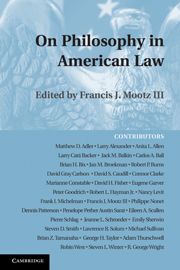Book contents
- Frontmatter
- Contents
- Introduction
- PART I KARL LLEWELLYN AND THE COURSE OF PHILOSOPHY IN AMERICAN LAW
- PART II PHILOSOPHICAL PERSPECTIVES ON LAW
- PART III AREAS OF PHILOSOPHY AND THEIR RELATIONSHIP TO LAW
- PART IV PHILOSOPHICAL EXAMINATIONS OF LEGAL ISSUES
- PART V LAW, RHETORIC, AND PRACTICE THEORY
- 23 Foundationalism and Ground Truth in American Legal Philosophy: Classical Rhetoric, Realism, and Pragmatism
- 24 The Irrelevance of Contemporary Academic Philosophy for Law: Recovering the Rhetorical Tradition
- 25 Dicta
- 26 Recent and Future Concepts of Law: From Conceptual Analysis to a Practice Theory of Law
- 27 The Tasks of a Philosophy of Law
- PART VI QUESTIONING THE RELATIONSHIP BETWEEN PHILOSOPHY AND AMERICAN LAW
- PART VII COMMENTARIES
- Contributors and Selected Bibliography
- Name Index
- References
25 - Dicta
Published online by Cambridge University Press: 31 July 2009
- Frontmatter
- Contents
- Introduction
- PART I KARL LLEWELLYN AND THE COURSE OF PHILOSOPHY IN AMERICAN LAW
- PART II PHILOSOPHICAL PERSPECTIVES ON LAW
- PART III AREAS OF PHILOSOPHY AND THEIR RELATIONSHIP TO LAW
- PART IV PHILOSOPHICAL EXAMINATIONS OF LEGAL ISSUES
- PART V LAW, RHETORIC, AND PRACTICE THEORY
- 23 Foundationalism and Ground Truth in American Legal Philosophy: Classical Rhetoric, Realism, and Pragmatism
- 24 The Irrelevance of Contemporary Academic Philosophy for Law: Recovering the Rhetorical Tradition
- 25 Dicta
- 26 Recent and Future Concepts of Law: From Conceptual Analysis to a Practice Theory of Law
- 27 The Tasks of a Philosophy of Law
- PART VI QUESTIONING THE RELATIONSHIP BETWEEN PHILOSOPHY AND AMERICAN LAW
- PART VII COMMENTARIES
- Contributors and Selected Bibliography
- Name Index
- References
Summary
I should like to raise a query, however, whether the distinction taken between dictum and obiter dictum really corresponds to any definite usage of the legal profession. Most lawyers, I think, regard dictum as the elliptical equivalent of obiter dictum.
(Fuller 1934a: 551)Even by his own count or criteria, “On Philosophy in American Law” (PAL) must reckon low on the list of Llewellyn's notable literary efforts (Fuller 1934b: 435). It is a short and unprepossessing article, an occasional paper that seems hurriedly written, slight in content, and significantly lacking in the author's usual stylistic flair. It is sketchy in tone, low on humor, free of polemic, and rather parochial in its references. Ostensibly focused on philosophy in American law, it in fact has nothing explicit to say about philosophy or philosophers. More than that, the law that is discussed by way of a few grand generalizations is far removed from the doctrine or guild talk that represents the practice that the realist wishes to describe, teach, and possibly also affect. To this we can add that, since its publication, the article appears to have slipped rapidly into the obscurity of the stacks. It was not reprinted in Llewellyn's collected essays and has seldom been referenced, let alone revived. It is something of an enigma, a marginal piece, a symptomatic exercise and as such should be addressed through its incidents, its rhetorical figures, its dicta, its asterisk footnote, and other asides.
- Type
- Chapter
- Information
- On Philosophy in American Law , pp. 215 - 222Publisher: Cambridge University PressPrint publication year: 2009



